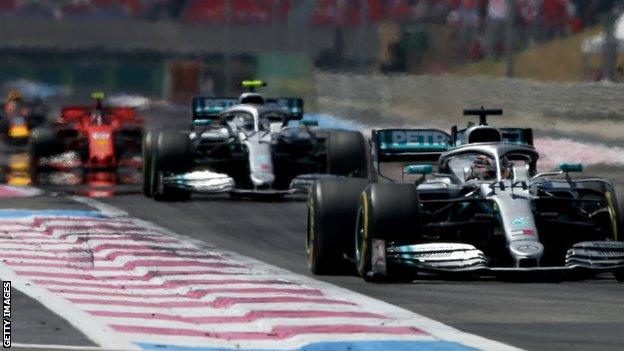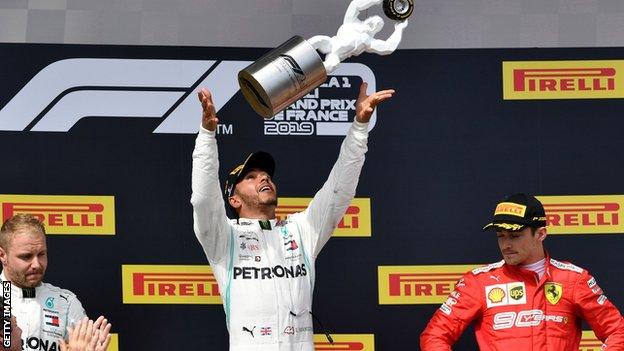Lewis Hamilton: French Grand Prix winner says 'don’t blame drivers if F1 is boring'
- Published

The French Grand Prix was Hamilton's sixth win in eight races
Lewis Hamilton says he "understands" if people find Formula 1 boring in the face of Mercedes' domination but says it is not his or the team's fault.
Hamilton's victory in Sunday's French Grand Prix was his sixth in eight races this year - his team-mate Valtteri Bottas has won the other two.
The world champion put the blame on the sport's bosses and in particular former leader Bernie Ecclestone.
"Don't point fingers at the drivers, we don't write the rules," he said.
"We have nothing to do with money shifting, all that kind of stuff. You should put the pressure on the people at the head, who should be doing the job."
The five-time world champion added: "It's really important for people to realise it's not the drivers' fault. This is a constant cycle of Formula 1 for years and years and years, even before I got to F1, and it's because the way Bernie had it set up and the decisions they were making back then. It's still the same.
"Until that management structure changes, it will continue to be the same, in my opinion. That's not my job to do that. My job's to come here and do the best I can as a driver."
Hamilton leads the championship by a massive 36 points from Bottas with only eight of the 21 rounds completed. Ferrari's Sebastian Vettel is 76 points behind Hamilton in third place.

After another double podium finish Mercedes have reached 338 points in the constructors' championship
Hamilton's remarks are a reference to the current prize-money structure in F1, which disproportionately rewards the top teams.
The arrangement, established by Ecclestone in the early part of this decade in an attempt to enhance his power and control, has created a two-tier system, with Mercedes, Ferrari and Red Bull far wealthier than the rest of the teams, who as a result cannot compete.
F1's new owner, the US group Liberty Media, which ousted Ecclestone when it took over in 2017, has plans to remedy the situation with a new financial structure, including a budget cap, and changes to technical and sporting rules from 2021.
Hamilton attended the most recent meeting of bosses discussing the rules in an attempt to help guide conversations in a way he felt might improve the racing.
Hamilton said: "They are trying, but for many, many years they've made bad decisions. Do I have confidence that it's going to shift massively? I have faith that it's going to get better. I really, really hope so.
"And to the point that I went to Paris last week to get involved. I was in that meeting, watching all the bosses of F1. I think there was the FIA and all the Formula 1 teams.
"I have nothing to gain by being there but if there's anything I can help… They've been making all these decisions and never once had a driver's input in that room, so if that can be the decisive point that helps shift it and the fans can get better racing, I will be proud to be a part of that."

Daniel Ricciardo commented on the F1 official Instagram page following an uneventful race in France
Hamilton was accompanied at the meeting by Grand Prix Drivers' Association chairman Alexander Wurz and Renault driver Nico Hulkenberg.
Hamilton's team boss at Mercedes, Toto Wolff, added that it would be wrong to blame Mercedes for making the sport boring.
"I hear you and from a fans' perspective I get it," he said, "but I think it's an unfair question because what would you do in our shoes? You would continue to push relentlessly for performance. It is what we do.
"But the fans see a race that is less enjoyable to watch."
Reflecting the fact that there is never a single reason why a specific event lacks action, Wolff also said that it could help the racing in France if the chicane that interrupts the long Mistral straight was removed, a suggestion that was made earlier in the weekend by Bottas - as well as last year by the late FIA F1 director Charlie Whiting.
Wolff also addressed claims by Red Bull boss Helmut Marko that a change in the tyres for this season, which seems to have inadvertently helped Mercedes' competitiveness, should be reversed to bring the field closer together.
"This is an unforgiving high-tech sport and we gave it a big push over the winter to understand how the tyres worked last year and it seems we have done OK.
"Changing the regulations mid-season is almost like introducing a balance of performance in a sport that was always about unforgiving excellence."